Contents
When people are dizzy, it often becomes dark in the eyes. These two symptoms can develop simultaneously, for example, after excessive physical or psycho-emotional overstrain. In addition, such attacks can be a symptom of dangerous diseases.
Do not ignore the darkening of the eyes, accompanied by dizziness, especially if these symptoms occur on a regular basis. Be sure to go to the doctor and undergo a comprehensive examination.
Why does it darken in the eyes and dizzy?
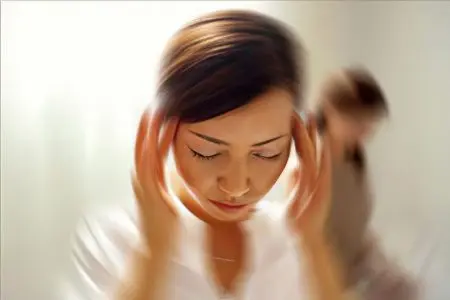
If a person has excellent health, but from time to time it gets dark in his eyes, then this symptom is not always associated with any pathologies. Although it is impossible to exclude the disease by 100%.
The main factors that lead to darkening in the eyes are:
Lack of fluid in the body. To avoid health problems, every day you need to drink at least 2 liters of water.
Prolonged hunger strike. A similar symptom is often observed in people who adhere to a lean menu or are on a strict diet.
Age-related changes in the body: menopause, old age, puberty.
Adherence to bad habits. In this regard, smoking, alcohol abuse and drug use are dangerous.
Excessive physical activity, unbearable for a person.
High levels of hemoglobin in the blood.
Lack of vitamins and minerals.
Diabetes mellitus and other endocrine pathologies.
Childbearing period.
Why does it get dark in the eyes when you get up?

Often people notice that they get dark in their eyes when they rise sharply from a place. The main cause of this symptom is oxygen deficiency in tissues and organs. This condition is characterized by the term hypoxia. Lack of oxygen causes orthostatic hypotension, which often develops with heart disease. If it darkens in the eyes when getting out of bed, then this may indicate that the person has low blood pressure.
Often doctors hear complaints of darkening in the eyes from patients who take medications such as:
Vasodilators.
Diuretics.
Antidepressants.
With a sharp decrease in blood pressure, a person will always darken in the eyes. In this case, symptoms such as:
Weakness in the body.
Deterioration of attention.
Dyspnea.
Memory impairment
Darkening in the eyes should not be ignored. First you need to sit down so as not to get injured. Sometimes the darkness in the eyes disappears after the person calms down. When this phenomenon is observed often, you need to go to the doctor.
What to do if it gets dark in the eyes?
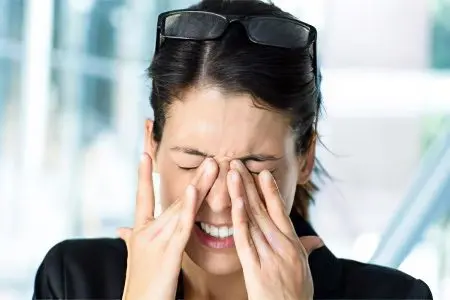
If it gets dark in the eyes and the head begins to spin, then in order to cope with the attack, you must follow the following recommendations:
It is necessary to try to saturate the body with the maximum amount of oxygen. To this end, you can go outside, take a comfortable position, breathe fresh air. If you are in a stuffy room, you should open the windows. If there are elements of clothing on the neck and chest that restrict breathing, you need to get rid of them.
In order not to fall, you need to sit down or lie down. It is good if it is possible to raise the legs to an elevation so that they are above the head. Thus, blood will flow better to the brain.
Be sure to use a tonometer and measure blood pressure.
When a person clearly understands what is the cause of the attack that happened, it is necessary to direct efforts to eliminate it. If the eyes of a diabetic get dark due to hunger, you can drink a glass of sweet water. This measure will increase the level of glucose in the blood and cope with the attack.
If the head is spinning and darkens in the eyes due to prolonged exposure to the sun, then you need to go into the shade or into a cool room.
Provided that the attack happened once, you should not panic. However, regularly occurring darkening in the eyes requires seeking medical help.
What can not be done?
If a person does not know what is the cause of the attack, it is forbidden to take any medications. Otherwise, you can harm your health. You should not make sudden movements, you can not quickly turn your head, tilt it down, as this can lead to a fall. Be sure to visit a doctor, or call a team of doctors at home.
It is forbidden to squat and bend down. You need to take the most comfortable position. You should not start smoking or drinking alcohol after the attack is over.
Reasons not to be ignored
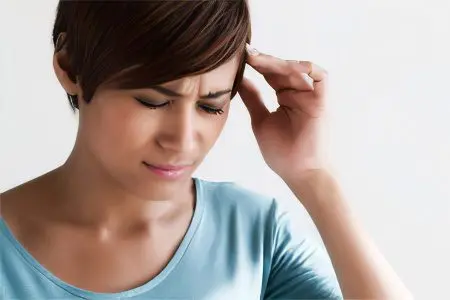
Sometimes a person gets dark in the eyes and dizzy due to various diseases, among them:
Vegetovascular dystonia. The head can not only spin, but also hurt. Pain is localized in the temples and in the back of the head.
Cervical osteochondrosis. At the same time, the head is spinning and darkens in the eyes of a person, most often in the morning and in the evening. The attack intensifies when turning the head, bending over and changing the position of the body.
Migraine. People with a migraine experience severe headaches and dizziness, and may experience tinnitus. Often patients complain of increased photosensitivity, nausea.
Diseases of the inner ear, which may be associated with a violation in the functioning of the vestibular apparatus.
Trigeminal neuralgia. At the same time, the person’s eyes darken. Treatment should be immediate, as the disease threatens with serious complications. Most often, antibiotics are required.
Cancer tumors. Attacks of dizziness and darkening in the eyes will happen on an ongoing basis.
Anemia, accompanied by a decrease in the level of hemoglobin in the blood. Normally, the blood contains a large number of red blood cells (erythrocytes), which are responsible for transporting oxygen to tissues and organs. With anemia, the body will suffer from oxygen starvation. First of all, it affects the state of the brain. Therefore, anemia is always accompanied by bouts of dizziness. The patient’s skin turns pale, weakness increases. Various pathologies of the digestive system, growing tumors, etc. can provoke the disease.
Stroke. This ruptures the arteries in the brain, which leads to damage to its tissues. This condition requires emergency medical care.
Hypoglycemia with a drop in blood sugar leads to the fact that a patient with diabetes begins to feel dizzy and dark in the eyes. In severe cases, a person may even fall into a coma.
Cataract. Dizziness often develops with cataracts, since the deterioration of blood flow in the eyeball leads to a disruption in the transmission of information to the brain.
orthostatic hypotension. This pathology is associated with somatic and neurological disorders, which leads to a sharp decrease in blood pressure. The body hardly adapts to the rapidly developing hypoxia, which leads to an attack of dizziness and darkening in the eyes. Most often this situation happens after a night’s rest. The severity of symptoms and their duration may vary. Sometimes patients even faint. In addition, sweating may increase, and pain occurs in the epigastric region. Psychosensory impairment is a severe manifestation of hypotension. The disease needs high-quality therapy.
Postponed injuries of the skull and brain.
Vertigo attacks haunt patients with cardiovascular diseases, as they always provoke a violation of blood flow to the brain.
Methods of diagnosis
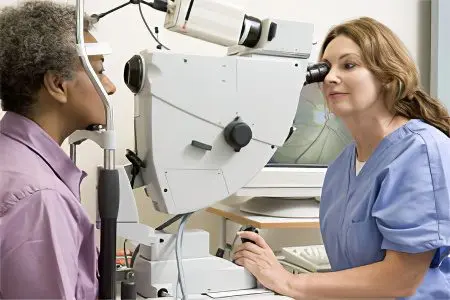
A person who goes to the doctor with complaints of dizziness and darkening in the eyes needs to be prepared for the fact that he will be prescribed a lot of research. Only a comprehensive diagnosis will determine the true cause of seizures.
Possible diagnostic measures:
Determination of the pressure level.
Ultrasound of the vessels of the neck and brain.
MRI of the brain.
Encephalography.
Computed tomography of the cervical spine. In addition, this study allows you to detect cancerous tumors.
Examination of the fundus, measurements of eye pressure.
Blood donation for general and biochemical analysis. Be sure to determine the level of cholesterol, hormones and hemoglobin in the blood.
Performing bacterial cultures and blood sampling to identify viral and bacterial infections, as they can lead to impaired brain function.
Performing neurological tests.
Treatment
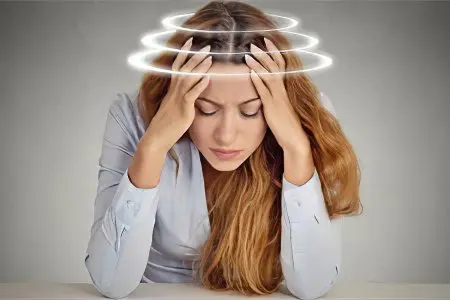
Sometimes, in order to get rid of attacks, it is enough just to change your eating habits, as well as follow regimen moments and take enough time to sleep. Although in some cases dangerous conditions lead to dizziness that require serious treatment.
Drugs that can be prescribed to the patient:
Antibiotics and anti-inflammatory drugs. They are prescribed for the treatment of otitis media, as well as infections that affect the brain.
Antidepressants, sedatives and drugs that normalize blood flow. Such treatment is indicated for patients with VVD, with jumps in blood pressure, as well as for people who have experienced severe stress or erasing depression.
B vitamins, calcium antagonists and drugs that improve brain nutrition. Such drugs are indicated for use in patients with hypoxia and people engaged in heavy mental work.
Massage, physiotherapy, and taking drugs that normalize vascular tone are indicated for patients suffering from osteochondrosis or other diseases of the cervical spine.
Hormones should be taken by patients with disorders in the endocrine system.
Iron-containing drugs are prescribed for patients with anemia.
The dosage of drugs, as well as the duration of the course of treatment, is determined by the doctor, based on the individual characteristics of the course of the disease.
Prevention

To minimize the risk of an attack of dizziness and darkening in the eyes, the following recommendations should be observed:
Be outdoors as often as possible.
Adhere to the principles of good nutrition.
Harden by taking a contrast shower.
Increase physical activity, engage in Nordic walking.
Visit a massage therapist.
Drink enough water.
To refuse from bad habits.
Regularly undergo preventive examinations.
Allocate enough time for rest, sleep at least 8 hours a day.
More often to be in the fresh air, regularly ventilate the premises.









